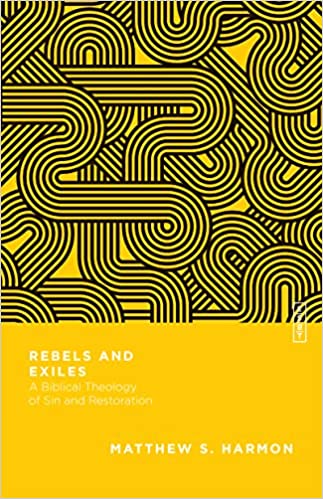An Author Interview from Books At a Glance
Greetings! I’m Fred Zaspel, and welcome to another Author Interview here at Books At a Glance. Today we’re talking to Dr. Matthew Harmon about his new installment in IVP’s Essential Studies in Biblical Theology series, entitled, Rebels and Exiles: A Biblical Theology of Sin and Restoration. It’s a big theme and important, and it’s a wonderful one.
Matt, great to have you with us, and congratulations on a unique and intriguing new book.
Harmon:
Thanks, Fred! Always good to talk with you.
Zaspel:
Just in broadest terms, what is your book about? What is the theme you take up?
Harmon:
In this book, Rebels and Exiles, I am exploring this pattern that emerges very early in Scripture and runs from Genesis to Revelation. We look at how human rebellion and sin lead to us being exiled away from God’s presence. That theme emerges right in the first few chapters of Genesis. It is a theme that continues on the macro level all throughout the biblical storyline. It also has individual episodes where that theme repeats itself on a personal and national level with Israel. I flesh out how that theme expands and develops throughout the Old Testament.
This theme anticipates the work of Jesus, who will be the one to deal with our rebellion through his life of perfect obedience. Then his death on the cross will bring judgment upon our sin and end our exile. Finally, his resurrection from the dead, which is the beginning of our restoration to God’s presence, through his work. That works itself out even in the New Testament when it comes to God’s gift of his Spirit to us as we live in the fallen world as exiles, as we await our heavenly home in the new creation.
Zaspel:
Okay, sketch out the theme for us. Maybe you could just give us a tour of your book and how this theme unfolds in Scripture.
Harmon:
We start with Genesis and try to flesh out how even in the garden you have us as humanity experiencing God’s presence in God’s place. When humanity, Adam and Eve, rebels against God, the reality of God’s people in God’s place and in God’s presence are fundamentally altered. Eventually along comes the promises God makes to Abraham. Through the Abrahamic promise, that is the means by which God is going to recreate his people and restore them to a place they can experience his presence. That develops into the nation of Israel. God calls his people out of Egypt and brings them eventually into the promised land with his presence. It becomes clear the fundamental problem of human sin and rebellion has not been definitively dealt with. Israel sins and experiences exile from God’s presence. The fullest expression of that is them being taken out of the land where God especially dwelt with them. All along you have God sending these warnings through his prophets. They warn them if they do not respond to God’s warnings, that they will experience this form of exile. I try to trace that throughout the entire Old Testament.
In the individual chapters dealing with the garden, God’s formation of Israel, threats of exile, if and when Israel rebels. Also, I try to highlight the promises that God will bring restoration to them through a new exodus that will be led by this servant figure. I have two chapters on how the work of Jesus addresses our exile. Then a chapter on what it looks like to live as exiles in this fallen world. That is a theme that more and more Christians are waking up to as the reality of our current experience. Many parts of our current cultural moments at least in the United States and larger parts of the West are changing. Culminating in the final chapter looking at the new heavens and new earth. All those themes of God’s people in God’s place, experiencing God’s presence come to full realization into that new creation. The underlying themes I tap into from the beginning to the end, is this profound human longing that we have for a place that we can call home, belong, are known, and all our labors have value. We experience who were made to be as God’s image-bearers. I try to tie it together at the end with how our experience in the new heavens and new earth will be.
Zaspel:
Just to sharpen our focus and make sure we do not miss it, explain for us how this theme centers on the person and work of Christ.
Harmon:
When you look at the gospel accounts, one of the ways they show us who Jesus is by portraying Jesus as reliving Israel and even Adam’s experiences. He obeyed where they had failed. We see that most clearly in the temptation narratives. Even in the first four chapters of Matthew’s Gospel. Jesus is the obedient Son. The one who is obeying where Israel has failed. It establishes him as qualified to be our substitute, as the one who will bear our curse for Israel’s sin. He does that by his death on the cross. He is outside the city, exiled. He is in Jerusalem, where God’s presence was most clearly intended to dwell with God’s people. He is experiencing our exile and the ultimate exile of death. He experiences that on our behalf, he experiences restoration and resurrection. When you look at the Old Testament when resurrection is talked about it is regularly linked to restoration. God restoring these people from exile. Pouring his spirit upon his people is the most tangible expression of God’s presence within us. As believers we put our trust in Jesus, his obedience becomes our obedience, his death becomes our death. His restoration becomes our restoration. His experience of the Spirit becomes our experience of the Spirit.
Zaspel:
Just how big and how inclusive is this theme?
Harmon:
Within scholarly circles, there has been discussion about how important this theme of return from exile is. The most notable example of someone who sees this as central to the biblical story is N. T. Wright. He argues especially for the life and ministry of Jesus, saying that that is the dominant paradigm for understanding what Jesus is doing. Understanding restoration from exile. In an earlier version of the book, I had a short appendix. I argued it is an important theme, but I am not saying it is the most important theme. It is one of several important themes.
When you do biblical theology there are several themes that you can explain the storyline of the Bible from the lens of a particular thread or theme like this. It is very all-encompassing. It is a mistake to try to elevate one of those themes. We must look at it through key themes through aspects of the story that we might miss if we do not look through that lens.
Zaspel:
How does an understanding of this theme teach us Christians to live in this world?
Harmon:
We as Christians in the United States and other western cultures are seeing our position within the larger culture being more and more marginalized. I think it is an opportunity to reflect on the reality that this world is not our final and ultimate home. We are in a similar position to what the Babylonian exiles were in. What does God say to them? Seek the welfare of the city, look for the good and benefits of the culture you live in, but realize you are never going to feel fully at home in that culture. That is something we as Christians need to hear. No matter how good things might get for us from a cultural or a political perspective, this world is still not our home. We are not going to be able to create the new heavens and the new earth through our efforts. If we have that dynamic of working for the good but not putting our hope in producing what only will ultimately happen in a new creation.
Zaspel:
We are talking to Dr. Matthew Harmon about his excellent new book, Rebels and Exiles: A Biblical Theology of Sin and Restoration. It is a huge theme and an important one, but Dr. Harmon tracks it out concisely and clearly. It is one of those themes and one of those books that help you understand the Bible’s big picture.
Matt, thanks again for your good work and for talking to us about it today.
Harmon:
Thank you for having me, I appreciate it.

